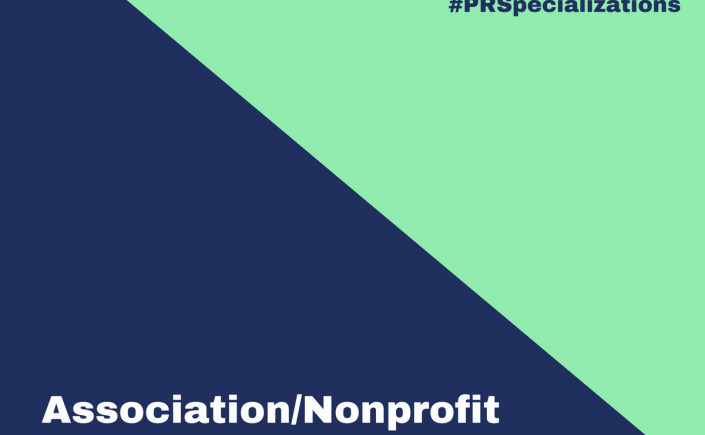Glamorizations of public relations usually show a chic woman in a big city, working one-on-one with clients. She attends swanky parties and always gets her clients the right attention without much more effort than snapping her fingers.
That’s what I thought would be in store for me with a career in PR when I first started studying. I daydreamed about working at an agency, managing client accounts and pitching new ideas in meetings and stories to media, mainly because that was the only real path that was discussed at length. PR people work for agencies, serving clients, right?
Wrong. There are so many other paths, so many other adventures you can go on. A quick look at PRSA’s website shows 14 different professional interest sections, representing just a handful of specialization options out there for pros to find the best fit for their skills and interests. As it turns out, nonprofit/association communications was the best fit for me.
Working for a nonprofit or association is a great way to get experience in a lot of different areas. Most nonprofits operate with limited resources, meaning an organization’s communications department may literally be a one- or two-man shop. It can be a little frightening to step in and be responsible for so many moving parts – social media, media relations, content development, creation, management and marketing, event planning, stakeholder relations, fundraising…the list could go on and on – but its equally as exciting.
Including internships, I’m currently at my fourth nonprofit/association and no two days have been identical yet. Since nonprofits and associations are typically topic- or issue-oriented, there’s a diverse array of organizations to choose from.
Here are five things I’ve found exciting about working at a nonprofit and three lessons I’ve learned along the way.
Five things I love about nonprofit/association communications:
- Room to take on new responsibilities
Since most nonprofits and associations have smaller staffs with limited resources, there’s often an opportunity to take on more responsibilities than initially assigned – and you should! Communications roles in particular tend to have pretty general position descriptions focusing on the day-to-day and tactical. And while everyone does have to pitch in on the administrative work, there’s no reason you can’t set your sights higher and on something to boost your own career. Want to get more experience with the media? Suggest pitching in with the pitching. Is your organization lacking a clear communications strategy? Take the lead and volunteer to lead a couple brainstorming sessions before taking the first crack at a comprehensive strategy to define SMART goals and deliver results. When you find an opportunity to enhance your skills in a way that will ultimately benefit your organization, speak up about how you think you can help. - Room for innovation
With limited resources and budgets, there’s a lot of room for trying new things. There’s no monopoly on who can come up with great ideas, so flex your muscles and make sure you’re making time to brainstorm and keeping track of your ideas for when they might be useful. Those ideas are great to pull out of your back pocket when issues arise – true no matter the industry you’re in, but the smaller the organization, the more open they tend to be to trying new, sometimes exciting, ideas. - No two organizations are the same
While many nonprofits or associations share similarities – small in size, low operating budgets, limited resources – no two are identical. Some are issue-based, some are industry-specific and others are more general. Working in the nonprofit space doesn’t mean that your organization’s issue has to be your most passionate cause, but it’s important to care about the work you’re doing. Going in with an open mind and an interest in what you’ll be focusing on will go a long way, but understand that your experience may differ from organization to organization. - You can learn a little about everything
In my experience, there are plenty of opportunities to help with other organization functions outside of communications. No matter the organization or industry, communications touches all other departments in some way, shape or form. Whether you’re working together on projects or crossing disciplines entirely, there’s plenty of room to learn a little about everything your organization does – from operations all the way down. - Flexibility
Since there’s usually not much wiggle room as far as salary goes, there’s sometimes a bit of room to negotiate on other things. Remote work, comp time and professional development opportunities are just a few of the things you may be able to more easily ask for. In a past job, my responsibilities often included work outside of the normal 8-to-4, meaning I was working and not getting paid for it. As a way to accommodate the need to work at odd hours sometimes, I was able to negotiate flexible hours that allowed me to leave earlier in the afternoon and work later in the evening, when things would often come up.
Three lessons I’ve learned
- Learning how to prioritize and balance everything
Nonprofits often have a lot going on and sometimes it can feel like you’re expected to be a jack-of-all-trades – or a court jester with all the things you’re juggling. Learning how to prioritize can be tough. Sometimes it’s difficult because there are just not enough hours in the day. Sometimes it’s because everything becomes an emergency when there wasn’t enough time or energy put into planning. Or maybe you’ve just been too busy putting out fires that something just fell to the wayside. Whatever the reason, learning to keep track of where everything that you’re responsible for stands and a method for prioritizing responsibilities in a way that works for you can go a long way in easing the stress. - Making sure professional development is still a focus
Building right of of learning to prioritize and manage your responsibilities, it’s just as important to make sure that you’re continuing to grow and learn. This can be difficult at a nonprofit, or any smaller organization really, because time and money are often both limited. Not all employers will pay for memberships in professional organizations like PRSA or for professional development opportunities like courses and conferences. If continuing to grow professionally is important to you – and it should be – you may have to take it into your own hands and make time for it outside of or around work. This isn’t always an easy thing to do and it can be frustrating to feel like your organization doesn’t support you (which it may feel like sometimes), but the connections you make at events and the opportunities that may be open to you with every new skill you learn or fine-tune will be worth the time and energy. - Professional growth and knowing when it’s time to go
If you’re continuing to grow professionally, there may come a time when your organization is no longer the best fit for you. It can often be difficult to grow within a small organization because there are a limited number of positions to fill and the only role to aspire to may be your boss’s. If you’re ready to take on more responsibilities, it’s worth having a conversation with your organization’s leadership about what you’d like to be doing and why you think you’re ready for it. There may be room to adjust, maybe a new position can be created for you and an intern or new employee can be hired to pick up some of the slack. If that’s not the case, and you feel like there isn’t room for you to continue to grow, it may be time to look for new opportunities. This shouldn’t be something done sneakily if you’ve had these conversations about being ready for more. There are plenty of tactful ways to leave for a new opportunity without feeling like you’re abandoning ship.
 In her third year on PRSA’s New Professionals Section’s executive committee, Robyn serves as 2018 chair-elect. She’s a native of southern New Jersey and currently resides in Washington, D.C., by way of Pittsburgh and South Carolina. Robyn currently works for Airports Council International – North America (ACI-NA), a trade association representing North America’s airports, and holds a bachelor’s degree in Public Relations and a master’s degree in media arts and technology, with a focus on creative media practices, both from Duquesne University. She likes to spend her spare time cooking, reading, exploring, crocheting and spending time with her tail-less cat, Izzy. Learn more about her on her website or find her on Twitter & talk to her!
In her third year on PRSA’s New Professionals Section’s executive committee, Robyn serves as 2018 chair-elect. She’s a native of southern New Jersey and currently resides in Washington, D.C., by way of Pittsburgh and South Carolina. Robyn currently works for Airports Council International – North America (ACI-NA), a trade association representing North America’s airports, and holds a bachelor’s degree in Public Relations and a master’s degree in media arts and technology, with a focus on creative media practices, both from Duquesne University. She likes to spend her spare time cooking, reading, exploring, crocheting and spending time with her tail-less cat, Izzy. Learn more about her on her website or find her on Twitter & talk to her!

